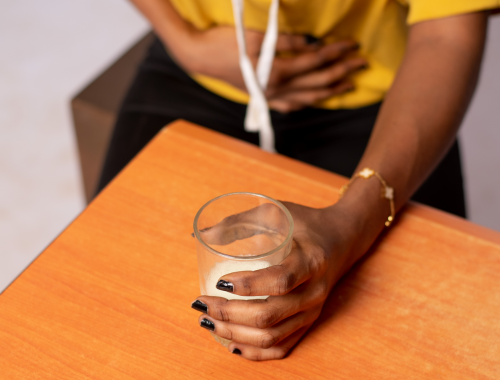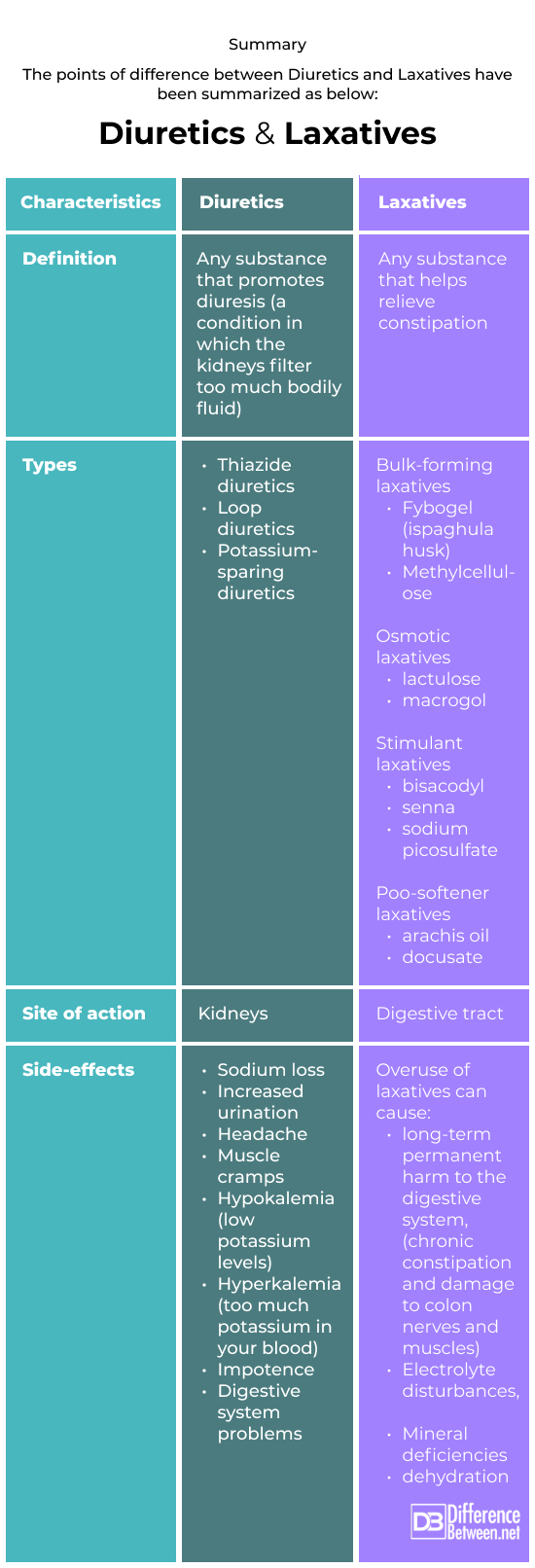Difference Between Diuretics and Laxatives

The main distinction between a laxative (help the body to get rid of poo) and a diuretic (water pills) is that the former induces bowel motions or loosens stools, whereas the latter encourages the production of urine.
Diuretics (help rid your body of salt (sodium) and water) and laxatives (help relieve and prevent constipation) are two examples of drugs that stimulate the body’s excretory systems. However, laxatives and diuretics differ in a number of ways.

Similarity
Diuretics and laxatives both do not share any similarity
Diuretics
Also termed as water pills, these drugs remove extra water from your kidneys and extra salt from your body through your urine.
Laxatives
Purgatives and aperients are other names for laxatives. They may consist of food or medications taken to stimulate bowel movements (eliminates waste from the bowel) or soften feces. When someone has constipation (inability to pass stools), they typically use laxatives. Diarrhea can occur when laxatives are used in a high enough dose.
Difference between Diuretics and Laxatives
Definition
Diuretics
Any substance or product that encourages diuresis (a condition in which the kidneys filter too much bodily fluid), or the push in the output of pee, is a diuretic – also known as water tablets. Included in this is forced diuresis – a frequently used method for eliminating toxins (administration of diuretic agents and isotonic saline). To sum up, diuretic are water tablets that help rid your body of salt (sodium) and water.
Laxatives
Constipation can be relieved (get rid of poop) and prevented with laxatives.
Mechanism
Diuretics
They work by reducing salt reabsorption at several locations in the nephron, which raises sodium and water losses from the urine. By blocking vasopressin receptors (heptahelical membrane proteins coupled to specific G proteins for intracellular signal transduction) along the connecting tubule and collecting duct, a second class of diuretics, often known as aquaretic (a novel class of drug that is used to promote aquaresis, the excretion of water without electrolyte loss), inhibits water reabsorption instead.
Laxatives
By acting on the intestinal wall, stimulant laxatives (bisacodyl, senna and sodium picosulfate), commonly referred to as contact laxatives (lactulose, macrogol, polyethylene glycol), promote bowel movements. The muscle contractions (tightening or shortening of muscle) that carry the stool bulk along are increased. Popular laxatives for self-care include stimulant laxatives.
Site of action
Diuretics
Kidneys
Laxatives
Digestive tract
Summary
The points of difference between Diuretics and Laxatives have been summarized as below:

FAQ:
Can I take a diuretic and a laxative?
No, it is not advisable to take both diuretic and a laxative. Comparing users to non-users, it was discovered that those who take laxatives and non-potassium-sparing diuretics (a subclass of diuretics which does not limit the secretion of Potassium into the urine) concurrently/simultaneously have a two-fold higher risk of heart/cardiovascular mortality.
What are laxatives and diuretics used for?
If you’re having difficulties going to the bathroom, laxatives are a sort of medication/drugs that can help you empty your intestines. If lifestyle adjustments like increasing the quantity of fiber in your diet (wholegrain cereals and fruit and vegetables), drinking enough of fluids, and physical activity/exercising frequently haven’t helped, they’re frequently employed to cure constipation.
Diuretics are helpful for people who have kidney problems, high blood pressure, edema, liver issues and heart failure. Diuretics remove extra water and sodium from the body.
Do laxatives remove excess water?
Laxatives dehydrate the body, which causes bloating (a buildup of gas in the stomach and intestines) because the body retains water to compensate for the dehydration (loss of water in the body). When taken improperly, laxatives are quite harmful, especially laxative stimulants like senna (sennoside), phenolphthalein (chemical compound with the formula C₂₀H₁₄O₄), and castor oil.
What are the 3 types of laxatives?
- Bulk-forming laxatives
- Osmotic laxatives
- Stimulant laxatives
- Stool softener laxatives
When should you not give a laxative?
If you experience signs and symptoms of appendicitis (a condition in which the appendix becomes inflamed and filled with pus) or an inflamed intestine, such as stomach or lower abdominal pain, cramps, bloating (a buildup of gas in the stomach and intestines), discomfort, nausea, or vomiting, avoid taking any sort of laxative. Consult your physician as soon as feasible instead.
Is Coffee a good laxative or a diuretic?
For the majority of people, coffee’s caffeine (a drug that stimulates your brain and nervous system) just acts as a moderate diuretic (any substance that promotes diuresis, the increased production of urine), causing the body to expel more liquid. (Consider going more often.) However, some people are more sensitively reactive than others, and hence feel the laxative effect (stimulating a bowel movement) more strongly. You may speed up the feces conveyor belt with coffee. Coffee can be called as an organic laxative.
- Difference Between Global Warming and Greenhouse Effect - May 18, 2024
- Difference Between Vaccination and Immunization - March 3, 2024
- Difference Between Selective Mutism and Autism - February 25, 2024
Search DifferenceBetween.net :
Leave a Response
References :
[0]Candy, B., Jones, L., Goodman, M. L., Drake, R., & Tookman, A. (2011). Laxatives or methylnaltrexone for the management of constipation in palliative care patients. Cochrane Database of Systematic Reviews, (1).
[1]Roush, G. C., Kaur, R., & Ernst, M. E. (2014). Diuretics: a review and update. Journal of cardiovascular pharmacology and therapeutics, 19(1), 5-13.
[2]Wile, D. (2012). Diuretics: a review. Annals of clinical biochemistry, 49(5), 419-431.
[3]Werth, B. L., & Christopher, S. A. (2021). Laxative use in the community: a literature review. Journal of clinical medicine, 10(1), 143.
[4]Image credit: https://www.canva.com/photos/MADVnSvs7wU-diuretic/
[5]Image credit: https://www.canva.com/photos/MAE_RCXKEmU-african-lady-with-upset-stomach-drinking-a-laxative/
